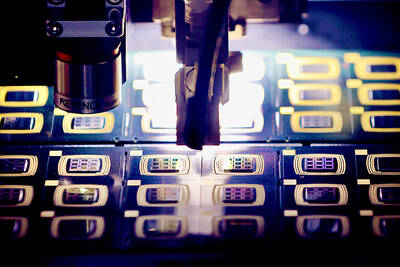Taiwan Semiconductor Manufacturing Co (TSMC, 台積電), the world’s biggest contract chipmaker, yesterday said it planned to ramp up spending on new facilities and equipment next year as part of an effort to stay ahead of peers by taking advantage of the global economic recovery.
The company’s expansion plans also matched better-than-expected pickup in the global economy, which is expected to rebound by 3.5 percent annually rather than 3 percent, as TSMC estimated in October, the company said.
“It’s all related. When the world economy dips, the semiconductor [industry] dips,” TSMC chairman and chief executive Morris Chang (張忠謀) said in a keynote speech during the company’s annual supply chain management forum.
With the help of stimulus and bailout packages from major developed countries, especially the US, “I think we can all be reasonably optimistic about economic future,” Chang said.
“So, the next two years look good, especially 2010,” Chang said, giving his outlook on the world’s semiconductor industry.
Revenues in the semiconductor industry may grow by 9 percent year-on-year next year and 5 percent in 2011, a rebound from this year’s 11 percent contraction, TSMC said.
To seek growth from recovering market demand, TSMC will allocate “much higher” capital spending next year than the US$2.7 billion budgeted for this year and US$1.8 billion last year. In October, the company only said the spending would be “higher.”
Next year, contract chipmakers led by TSMC will track the growth of chip designers, which are expected to grow by 16 percent next year and 8 percent in 2011, Chang said, adding that TSMC generates 75 percent of its revenue from supplying chips to chip designers.
TSMC will outpace competitors, he said. Randy Abrams, a semiconductor industry analyst at Credit Suisse, predicted that TSMC would spend as much as US$4 billion on new equipment next year, a report said on Thursday.
“We believe low inventory and good demand keeps 12-inch [plants] full into the first quarter of 2010, with a moderate seasonal pullback on 8-inch [plants],” Abrams said in the report.
TSMC’s revenues may slide by mid-to-high single digits in the conventionally slack first quarter from this quarter, versus an earlier estimate of a 10 percent decline, Abrams said.
This quarter, revenues may be between NT$90 billion (US$2.8 billion) and NT$92 billion, the chipmaker projected in October.
Meanwhile, Chang yesterday did not respond to a reporter’s question about whether the company is interested in acquiring local solar cell companies as he rushed toward an elevator after the speech.
Despite market speculation that TSMC may be interested in acquiring local solar cell makers, such as Motech Industries Inc (茂迪) and Neo Solar Power Corp (新日光能源), no company spokesperson was available to confirm the potential deals.
Motech, the nation’s biggest maker of solar cells, saw shares surge 4.5 percent to NT$129 yesterday, the highest since Oct. 27 last year, while Neo Solar rose limit-up to NT$76.5, Taiwan Stock Exchange data showed.
TSMC shares were unchanged at NT$61.5 yesterday.

AI SERVER DEMAND: ‘Overall industry demand continues to outpace supply and we are expanding capacity to meet it,’ the company’s chief executive officer said Hon Hai Precision Industry Co (鴻海精密) yesterday reported that net profit last quarter rose 27 percent from the same quarter last year on the back of demand for cloud services and high-performance computing products. Net profit surged to NT$44.36 billion (US$1.48 billion) from NT$35.04 billion a year earlier. On a quarterly basis, net profit grew 5 percent from NT$42.1 billion. Earnings per share expanded to NT$3.19 from NT$2.53 a year earlier and NT$3.03 in the first quarter. However, a sharp appreciation of the New Taiwan dollar since early May has weighed on the company’s performance, Hon Hai chief financial officer David Huang (黃德才)

The Taiwan Automation Intelligence and Robot Show, which is to be held from Wednesday to Saturday at the Taipei Nangang Exhibition Center, would showcase the latest in artificial intelligence (AI)-driven robotics and automation technologies, the organizer said yesterday. The event would highlight applications in smart manufacturing, as well as information and communications technology, the Taiwan Automation Intelligence and Robotics Association said. More than 1,000 companies are to display innovations in semiconductors, electromechanics, industrial automation and intelligent manufacturing, it said in a news release. Visitors can explore automated guided vehicles, 3D machine vision systems and AI-powered applications at the show, along

FORECAST: The greater computing power needed for emerging AI applications has driven higher demand for advanced semiconductors worldwide, TSMC said The government-supported Industrial Technology Research Institute (ITRI) has raised its forecast for this year’s growth in the output value of Taiwan’s semiconductor industry to above 22 percent on strong global demand for artificial intelligence (AI) applications. In its latest IEK Current Quarterly Model report, the institute said the local semiconductor industry would have output of NT$6.5 trillion (US$216.6 billion) this year, up 22.2 percent from a year earlier, an upward revision from a 19.1 percent increase estimate made in May. The strong showing of the local semiconductor industry largely reflected the stronger-than-expected performance of the integrated circuit (IC) manufacturing segment,

NVIDIA FACTOR: Shipments of AI servers powered by GB300 chips would undergo pilot runs this quarter, with small shipments possibly starting next quarter, it said Quanta Computer Inc (廣達), which supplies artificial intelligence (AI) servers powered by Nvidia Corp chips, yesterday said that AI servers are on track to account for 70 percent of its total server revenue this year, thanks to improved yield rates and a better learning curve for Nvidia’s GB300 chip-based servers. AI servers accounted for more than 60 percent of its total server revenue in the first half of this year, Quanta chief financial officer Elton Yang (楊俊烈) told an online conference. The company’s latest production learning curve of the AI servers powered by Nvidia’s GB200 chips has improved after overcoming key component